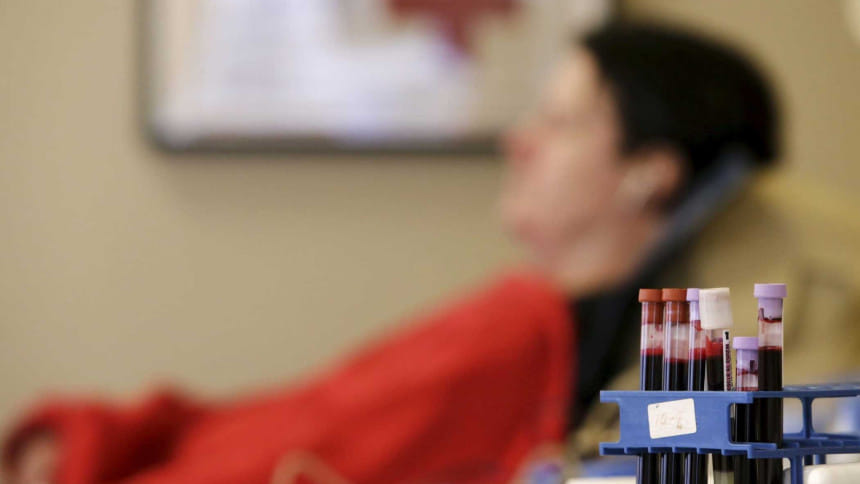Coordinated efforts needed to combat thalassemia

Ruma (not her real name) is working as a nutritionist and counsellor in an organisation that offers treatment and support to thalassemia patients. She was diagnosed with thalassemia in her adolescence and suffered from the disease for almost eight years, before she was able to get the right treatment, and her condition improved. She obtained a master's degree in nutrition. Now married, she enjoys her life and her job. Meeting her was inspiring, as she has proven that it is possible to have a functional life while dealing with a critical health condition like thalassemia.
In Bangladesh, there is a lack of data on thalassemia patients. The Bangladesh Thalassemia Samity Hospital conducted a survey on 4,000 students at different colleges, universities and institutions, and found that 10-12 percent of the participants were carriers of the blood disorder. Dhaka Shishu Hospital also had similar findings in another survey. With the available data, it could be safely said that more than 10 percent of the population in Bangladesh are thalassemia carriers. Presently, 90,000 children and adults are suffering from thalassemia, and it is estimated that around 12,000-15,000 children are born with it every year. Due to limited testing, many cases remain undiagnosed.
Thalassemia is an inherited—i.e. passed from parents to children through genes—blood disorder. This is caused when the body does not make enough haemoglobin, an important component of the red blood cells which carries oxygen throughout the body. When there aren't enough healthy red blood cells, not enough oxygen is delivered to all parts of the body, which may cause fatigue, weakness or shortness of breath. This is called anaemia. People with thalassemia may have mild or severe anaemia. Severe anaemia can damage organs and be fatal.
While visiting Bangladesh Thalassemia Samity Hospital, I met several young patients, who are brought there once or twice a month for blood transfusion. This is the only organisation in the country which was formed and is run by thalassemia patients and their parents. The hospital was established in 1989 by Omar Golam Rabbany, whose son was diagnosed with thalassemia in 1983 and died at the age of 22. At that time, there were very limited opportunities for thalassemia treatment in the country. Omar dedicated his life to support thalassemia survivors and create awareness to prevent the illness in Bangladesh.
Thalassemia is a treatable disorder that can be managed with blood transfusions and chelation therapy to prevent iron overload, which may happen due to the transfusion. A person with thalassemia will need to receive medical care on a regular basis from a doctor who specialises in thalassemia treatment. Keeping vaccinations up-to-date, eating nutritious food, exercising, and developing positive and supportive relationships also help thalassemia patients to maintain a healthy life. In some cases, thalassemia could be cured through bone marrow transplant. But this is an extremely expensive option, and there could also be severe side effects that could be life-threatening.
Traits for thalassemia are more common among people from Mediterranean countries, like Greece and Turkey, as well as among people from Asia, Africa, and the Middle East. A review of the effectiveness of thalassemia prevention programmes, published by the Thalassemia International Federation in 2021, looked at data on different components of thalassemia prevention and treatment measures in 51 countries from various regions, and each country was given a grade between A and D (D is the lowest and "describes countries which demonstrate serious weakness, gaps and challenges calling for many and multiple actions to be taken at the national level"). Bangladesh received the grade D, which means we must do more regarding thalassemia prevention and treatment.
There are several government and NGO-run hospitals across Bangladesh which provide treatment for thalassemia, but the existing system is widely inadequate. It is a struggle to get the amount of blood required for those who need transfusions. Some of the medicines (e.g. chelating agents) are also very expensive. Thalassemia treatment could cost from Tk 7,000-20,000 per month. It is challenging to afford such costly treatment for most people in Bangladesh. Some organisations offer free treatment, but they cannot fulfil the needs of all those who require the support. Many thalassemia patients remain untreated and die premature deaths. Some awareness-raising efforts are there, but they are quite inadequate too.
A person who is only a carrier of thalassemia does not have any symptoms and can lead a regular life. If both parents are carriers of thalassemia, then the risk of their child having the blood disorder is higher. A simple test (haemoglobin-electrophoresis) could identify if someone is a carrier. If young people receive information on thalassemia before entering a relationship and get tested free of cost, then they will be able to make responsible decisions. Media can also play an effective role in creating mass awareness regarding the importance of preventing thalassemia. Nobody should feel guilty for being a carrier or patient of this disease. And everyone should be made aware that it's not a contagious disease either. This may be helpful in protecting thalassemia patients from facing potential discrimination in their communities.
Thalassemia prevention efforts include creating a database of the patients, pre-marital screening and counselling, training of doctors and other healthcare professionals, and public awareness. It is due to a combination of these initiatives that thalassemia has come to an almost zero level in Cyprus and several other Mediterranean countries.
During a conversation, Dr AKM Ekramul Hossain Swapan, CEO of Bangladesh Thalassemia Samity Hospital, told me: "In Bangladesh, the government has announced the establishment of specialised thalassemia centres in all divisional hospitals, in addition to government hospitals in Dhaka, which will gradually be expanded to the district level. They also have plans to create awareness throughout the country. This is positive news. In addition, a national strategic plan for thalassemia prevention and treatment should be developed, and actions have to be taken for implementation of the plan. It is important to coordinate government and NGO-run initiatives, which will be helpful in strengthening all efforts to prevent thalassemia, and offer effective treatment and support to the survivors."
Let's hope that the government will provide leadership in coordinating all efforts regarding thalassemia prevention and awareness. This will contribute to ensuring quality of life for thalassemia patients, and create better support systems for patients with thalassemia.
Laila Khondkar is an international development worker.

 For all latest news, follow The Daily Star's Google News channel.
For all latest news, follow The Daily Star's Google News channel. 



Comments